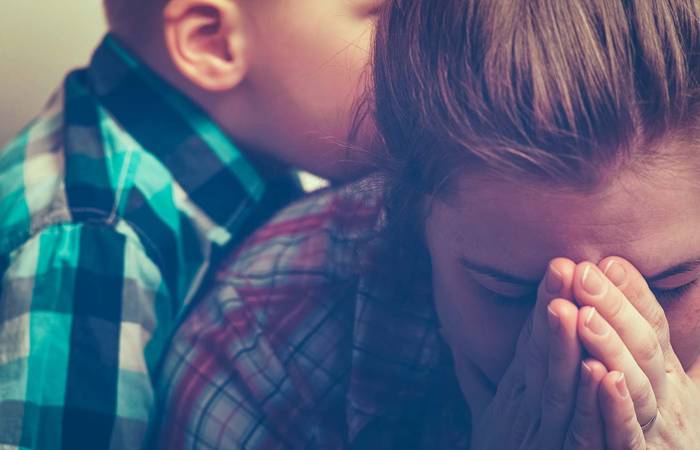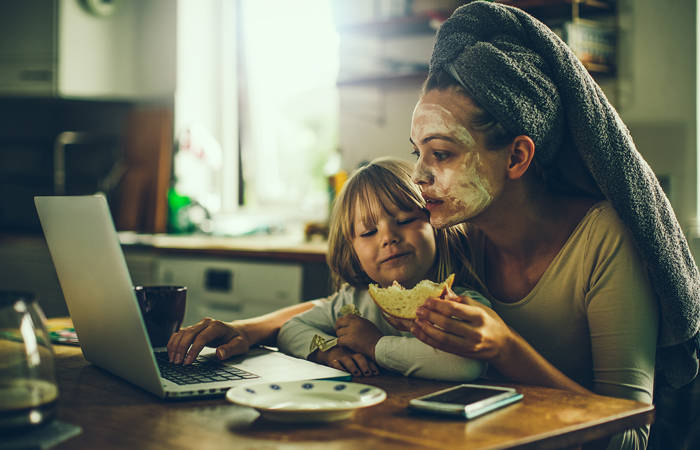Like what you see?
Sign up to receive more free parenting advice.
Thank you for subscribing to our newsletter!
Child Development

Credit: iStock.com/Solovyova
Parenting can be stressful. University of Queensland Associate Professor Alina Morawska says data shows it is common for parents to experience stress, and it makes what can sometimes be a challenging job even harder.
Add to parenting a particularly challenging period – or a year like 2020 – and it’s no wonder parents can find it hard to manage our own emotions. But why is it so important to do so?
“I guess the important thing is that parenting is much easier when parents are able to be calm and respond calmly to their children,” says Associate Professor Morawska, Deputy Director (Research) at the Parenting and Family Support Centre.
“So if a parent is feeling anxious, worried or stressed, or angry and frustrated it does make that job harder.”
The importance of self-care
Although it can be a difficult thing to do when our children are young, Associate Professor Morawska says carving out time to look after ourselves is incredibly important.
“It’s very hard to be a calm, patient, responsive and sensitive parent if your own needs aren't being met,” she says.
As self-care looks different for each individual, the key is to find something you can fit into your routine that feels supportive to you.
“For some people, going for a walk is a stress reliever. For some people, having a cup of tea, reading a book, talking to a friend, doing some meditation or some relaxation exercises. Any of those can be helpful.”
Finding sources of support, people you can talk to, people you can go to, somebody to babysit or look after your child for a little while is really important.Associate Professor Alina Morawska
Stay up to date with the latest news and articles from First Five Years
Thank you for subscribing to our newsletter!
Parenting under pressure
It can also help to have some practical tools in place. 2020 has ripped apart many of our usual routines – for example, parents might be working from home or have lost their jobs, or the children might be at home because they're not at school or at early learning and care.
Associate Professor Morawska says establishing routines wherever possible (or creating new ones) is worth the effort.
“Children benefit from routines and so do adults. A routine creates a sense of control over a situation where parents often don’t have an awful lot of control, like when the baby’s crying or upset and you can't find the reason,” she says.
Professor Morawska says children respond to routine because it helps them know what to expect, to understand boundaries and build a sense of confidence and independence. But there’s a little-discussed side benefit to routines for the adults implementing new routines this year.
“It’s particularly important in uncertain times because, in some ways, it reduces the number of decision points. You don’t have to decide ‘do I do this or this now’ because you’ve got a routine for that.
“One of the things that this year has brought is a sense of a loss of control and an anxiety and worry about, ‘What’s going to happen tomorrow?’. We have needed to think about things like, ‘Do I need to buy this now or tomorrow? Can it wait? Can I plan anything?’. In the pandemic situation there’s certainly lots of reports of people being anxious simply because of all the extra decision making we have to do around small things,” Associate Professor Morawska says.
Although 2020 has seen many families’ support networks severely limited by COVID-19, Associate Professor Morawska says the trend to live away from our family of origin has been brewing for many years.
“Finding sources of support, people you can talk to, people you can go to, somebody to babysit or look after your child for a little while is really important,” she says.
Remember, no parent is perfect
While it’s easy to aspire to ‘parenting perfection’ Associate Professor Morawska says that’s an unrealistic approach at the best of times. In fact, all parents make mistakes.
“Mistakes are unlikely to be problematic as long as it’s not a routine pattern. I think the important thing is for parents to recognise that parenting can be a challenging job at any time, and it’s much more challenging at the moment. And so in some ways, [people need] to take it easy on themselves and recognise that being a perfect parent is probably unrealistic at any time,” she says.
Help is there for those who need it.
“It’s important parents recognise that if they are experiencing a level of distress or anxiety, worry, sadness or depression that is unusual or atypical for them, or that they're finding it difficult to cope with those feelings that they do seek help and support.”
Associate Professor Morawska’s top tips for parenting under pressure.
- Ramp up your self care. Doing so will put you in a better position to deal with whatever is thrown at you.
- Create routines wherever possible. Not only do they benefit children, but they reduce some of the endless decisions needing to be made as a parent, which in itself can take the pressure down a notch.
- Find support. If you aren’t able to see family, you can aim to strike up a closer relationship with neighbours so you can help each other in simple ways.
- Remember, nobody is perfect. It’s important to go easy on yourself, particularly in challenging times.
Reach out for help:
- Beyond Blue has a special hotline for anyone struggling to cope during the pandemic: 1800 512 348
- Lifeline: 131144
- Parentline: Phone counselling for parents in most states and territories.






